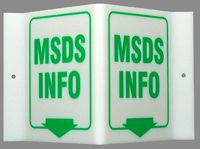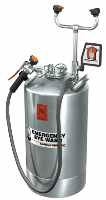 |
 |
| MSDS Topics |
Free Sites | FAQ's | Regulations | Glossary | Software | Suppliers |
| Books | Forum | Poll | Fun stuff | Quiz | Store | |
| MSDS and safety supplies | Search ALL our MSDS info | |||||
 | |||
 |
 |
 |
|
| Title: 10/21/1996 - Clarification of the OSHA Hazard Communication Standard. | |
| Record Type: Interpretation | Standard Number: 1910.1200 |
October 21, 1996
Mr. David G. Sarvadi
Keller and Heckman LLP
1001 G Street, N.W.
Suite 500 West
Washington, D.C. 20001
Dear Mr. Sarvadi:
Thank you for your letter of May 16, requesting clarification of the Occupational Safety and Health Administration's (OSHA) Hazard Communication Standard (29 CFR 1910.1200). We understand that your letter basically asked the following two questions:
For hazard communication purposes, the standard allows a business entity functioning as the chemical manufacturer to meet the standard's requirements as the chemical manufacturer, and also when distributing the product in a retail store, as the retail distributor, meet the standard's requirements for retail distributors. A retail distributor is one that primarily sells to the general public for personal or household use. The intent of the provision, (g)(7)(iii), was to reduce the burden on retail distributors because they typically do not sell to commercial customers.
|
We must disagree with your statement on page 3 paragraph 3 of your letter that states "...it is also acceptable, with respect to products manufactured by another manufacturer, for these retail distributors to refer persons requesting an MSDS to the other manufacturer." When an employer with a commercial account at a retail distributor requests an MSDS, the MSDS must be provided with the purchase by the retail distributor. In this case, the retail distributor cannot refer the customer to the chemical manufacturer for the MSDS. The HCS (1910.1200(g)(7)(v)) does allow a retail distributor, who does not have commercial accounts, to refer the employer to the chemical manufacturer, importer, or distributor for the sheet. OSHA also allows wholesale distributors to provide an MSDS on request in over-the-counter sales operations as described under paragraph (g)(7)(iv) of the standard. This provision is for over-the-counter type operations only. As stated in the preamble to the final rule (59 FR 6162), "wholesale distributors that have over-the-counter sales should be permitted to provide MSDSs on request as their operations are similar to those of concern in retail establishments." Consequently, the commercial stores (wholesale distributors) mentioned in your letter could choose the alternative compliance strategy in 1910.1200(g)(7)(iv).
|  Mark the locations of your safety equipment and training materials with signs from Safety Emporium. |
Sincerely,
Ruth McCully
Director
Office of Health Compliance Assistance
May 16, 1996
VIA MESSENGER
Ms. Ruth McCully
United States Department of Labor
Occupational Safety and Health Administration
Frances Perkins Building
200 Constitution Avenue, N.W.
Washington, D.C. 20210
Re: Request for Clarification of Obligations of Chemical Manufacturers Who are Also Retail Distributors to Provide MSDS at the Time of Retail Sale
Dear Ms. McCully:
The purpose of this letter is to request written clarification of the Occupational Safety and Health Administration's (OSHA) interpretation of certain provisions of the Hazard Communication Standard (HCS) 29 C.F.R. 1910.1200, and the resulting obligations of chemical manufacturers which sell their products in part through company-owned and operated retail and wholesale outlets. We would like clarification of whether such a chemical manufacturer may avail itself of the provisions in the HCS permitting the distribution of Material Safety Data Sheets (MSDS) on request to walk-up retail customers.
We recently discussed this question by telephone with Mr. Thomas Galassi of your office. We understand that OSHA intends to treat these retail operations as distributors under the standard, as it is the nature of the retail transaction which led OSHA in August 1987 and in February 1994 to adopt certain changes to the HCS affecting distributor obligations with regard to MSDS. We ask for a written response at your earliest convenience.
Regulatory Background
Under 29 C.F.R. 1910.1200(g)(7)(iii)-(v), the HCS provisions in question, retail distributors may provide MSDS on request to walk-up retail customers. The definition of a "distributor" excludes chemical manufacturers as a class. The standard currently defines a "distributor" as
a business, other than a chemical manufacturer or importer, which supplies hazardous chemicals to other distributors or to employers.(1) [emphasis added].
If read literally, a company cannot be a distributor in its retail operations for products that it also manufactures.
________ FOOTNOTE(1) 29 C.F.R. 1910.1200(c).This leads to a significant discrepancy in the obligations of operators of retail distribution establishments depending solely on whether the store is owned and operated by the manufacturer of the products. The literal interpretation of this definition would preclude a chemical manufacturer from handling distribution of MSDS in its retail operations with respect to sales of its own products in the same fashion that a distributor who sells products manufactured by another party.
Discussion
In the hypothetical situation we presented to Mr. Galassi, a company may manufacture hazardous chemicals and also operate retail stores that sell those chemicals to both "walk-in" consumers and commercial accounts. We first asked whether OSHA expected such retail stores to provide MSDS with each product sold (i.e., OSHA would consider the stores to be "manufacturers"), or whether OSHA would treat the stores as "distributors" under the HCS. In our discussion we pointed out the definition cited above.
We do not believe that it was OSHA's intent to treat distributors supplied by affiliated manufacturers differently than distributors supplied by unaffiliated companies. Rather, we believe that it is the nature of the retail transaction which OSHA intended should be the focus of the exception to provision of MSDS.(2) That is, because it is not always clear whether the person purchasing a product in a retail store is an "employee" or an "employer" for purposes of the HCS, OSHA recognized in the 1987 final rule that it is cumbersome and unreasonably difficult for such distributors to provide MSDS with essentially every transaction.
________ FOOTNOTE(2) See the discussion in the Preamble to the final rule adopted in February 1994, referencing the Preamble to the earlier final rule adopted on August 24, 1987. 59 Fed. Reg. 6126, at 6161. (February 9, 1994).Accordingly, with respect to distribution of MSDS, transactions at the retail level, wherein customers (including the general public) may walk into a store to purchase items generally available for sale, are governed by the provisions in paragraph (g)(7) cited above. We believe that these provisions should apply to this kind of transaction regardless of the relationship between the store owner/operator and the manufacturer. When seen in this light, it is clear that fairness requires application of this regulation such that a manufacturer who is also a retail distributor may avail itself of the "on request" method in its retail operations. We believe that it was OSHA's original intention to treat all retail distributors similarly,(3) and that OSHA recognizes the unfairness in failing to do so, in spite of the literal reading of the language in the definition of "distributor".
________ FOOTNOTE(3) See 29 C.F.R. 1910.1200(g)(7)(iii).After discussing our question with others, Mr. Galassi confirmed our impression that OSHA did not intend to treat the retail distribution operations of chemical manufacturers differently than other retail distributors. Accordingly, we understand that OSHA will interpret these regulations to allow a chemical manufacturer that also operates retail distribution outlets to treat those retail operations as distributors under the HCS. Thus, those distributors are permitted to provide MSDS on request, and to post notices of their availability, as described in the applicable provisions of the regulations. It is this interpretation for which we seek confirmation.
We assume that OSHA will agree that it is also acceptable, with respect to products manufactured by another manufacturer, for these retail distributors to refer persons requesting an MSDS to the other manufacturer. We wish to have this interpretation confirmed as well.
 Working at a remote location? Portable eye wash units from Safety Emporium can help meet OSHA requirements. |
We also want to inquire whether OSHA will take the same position with respect to "commercial" stores owned by a manufacturer that operate as wholesale distributors serving industrial and construction trades people, as described in subparagraphs (v) and (vi). Commercial stores also serve a walk-up trade, and consumers as well as businesses may purchase products at such outlets. The principal distinction between a retail store and a commercial store is that the retail store will be located in a shopping center or in a retail district, with the result that proportionally more of the customers will be consumers as opposed to employees of businesses. Commercial stores may also handle products in package sizes not usually sold in retail outlets or normally available to consumers. Of course, we expect that such "commercial" stores would distribute MSDS directly upon request to customers falling within the definition of "commercial accounts" as well as to other customers, as provided in paragraph (g)(7)(iv). We would like to have OSHA's view on this question also. We also understand that this interpretation would not include distribution centers which do not have a walk-in retail trade. We assume that these distributors will be obligated to forward MSDS to their customers as is presently required under paragraph (g)(i) and (ii). We interpret paragraph (g)(7)(vi) as establishing an additional duty on wholesale distributors who are not eligible to avail themselves of the "on request" exemption for retail distributors from the general duty to transmit MSDS downstream required by subparagraphs (i) and (ii) to respond to requests from other downstream employers.
|
We trust that this letter accurately describes our request and that our understanding captures the Agency's position in this regard. We look forward to the Agency's confirmation of our understanding in this matter. In the meantime, should you have any questions concerning this matter, please do not hesitate to contact me.
Cordially yours,
David G. Sarvadi
The official, public domain, OSHA version of this document is available at http://www.osha.gov/pls/oshaweb/owadisp.show_document?p_table=INTERPRETATIONS&p_id=22279&p_text_version=FALSE